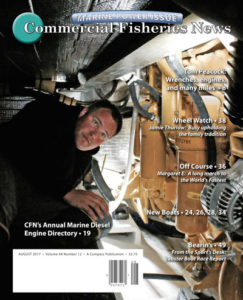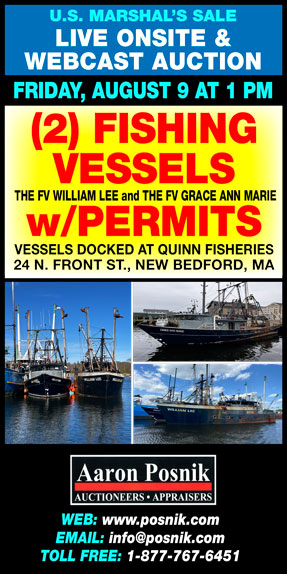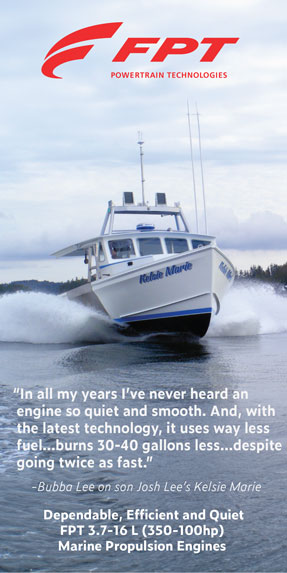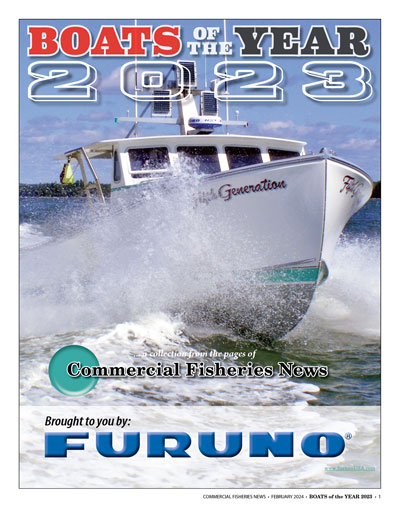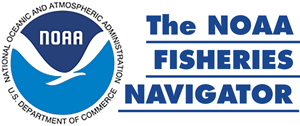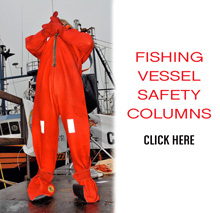GLOUCESTER, MA – NOAA Fisheries Greater Atlantic Regional Administrator (GARFO) John Bullard has recently announced he plans to retire on Jan. 5, 2018.
Bullard, who took the top job in the agency’s Gloucester-based office in 2012, will leave a legacy of improved relationships with fishermen, the research community, environmentalists, local, state, and federal officials and agency partners – including the New England and the Mid-Atlantic fishery management councils and the Atlantic States Marine Fisheries Commission (ASMFC).
As the regional administrator responsible for leading the agency’s approach to fisheries, habitat, sea turtle, and marine mammal issues from Maine to North Carolina (as well as the Great Lakes region), Bullard also provided a conduit toward helping fishermen understand the critical role of science in informing management decisions.
“As the former Mayor of New Bedford, Bullard brought with him a unique connection to the fishing industry, and used that connection to improve communication with all aspects of the industry and Congress during a very challenging period for the agency,” said Sam Rauch, NOAA Fisheries deputy assistant administrator for regulatory programs.
As regional administrator, Bullard worked with the fishery management councils and ASMFC to manage 44 fish stocks, including two – scallops and lobster – worth more than $500 million each.
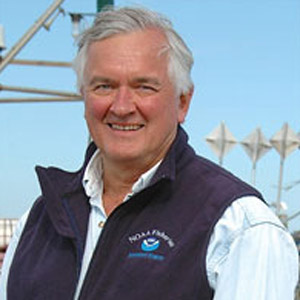
John Bullard (NOAA photo)
During his tenure, he faced the daunting New England groundfish crisis. Bullard met the challenge head on, making the tough and unpopular decision to impose emergency closures when the New England council failed to act.
“I know how difficult these issues are, and I tried to tackle them with courage and compassion,” says Bullard.
Bullard worked with Congress and state directors to deliver $32.8 million in disaster assistance to affected fishing families and communities.
In close collaboration with the New England council, Bullard then put quotas and closures in place to protect cod and other depleted fish stocks.
“We wish John well,” said New England council executive director Tom Nies.
“He is always willing to work with the council to find management solutions – and empowers those around him to actively participate in the process, which is one of his key accomplishments. That may go unnoticed by many, but it is one of the reasons our council has been able to complete so many management actions during his tenure.”
Bullard’s leadership in protecting living marine resources included removing approximately 30,000 miles of rope from Atlantic coastal waters to reduce whale entanglements and expanding critical habitat for North Atlantic right whales in the region by more than 25,000 nautical miles.
He also oversaw development of a strategy to restore river herring populations, imposed catch caps on mackerel and herring fisheries, and removed dams and created fish passages to double fish runs in key Maine, New Hampshire, and Massachusetts rivers.
“For me, John is an example of public service and more importantly, an example of working with stakeholders to have a positive impact on tough issues,” said Dr. Jon Hare, science and research director at NOAA’s Northeast Fisheries Science Center. “I will miss working with him and am thankful for his time as regional administrator.”
Bullard strongly supported groundbreaking actions created to bolster the Mid-Atlantic region’s important recreational and commercial fisheries.
In 2016, he approved the Mid-Atlantic council’s deep-sea coral amendment that protects 15 deep-sea canyons and a total area of 24 million acres (about the size of Virginia) where fragile, slow-growing corals live. These hotspots of biodiversity provide important habitat, refuge, and prey for fish and other marine life.
Bullard has also advanced an action to protect forage fish which serve as prey for larger fish, marine mammals, and sea birds. This would be the first ever action on the Atlantic coast to designate forage fish as important parts of the ecosystem and provide protection for them.
“Throughout his tenure as regional administrator, John has been an engaged and dedicated participant in the council process, and he has played an important role in increasing focus on the Mid-Atlantic portion of the Greater Atlantic Region,” said Chris Moore, executive director of the Mid-Atlantic Fishery Management Council.
“His insight and leadership have been especially valuable to the Mid-Atlantic council during the development of several new initiatives such as the Deep Sea Corals Amendment, the Unmanaged Forage Fish Amendment, and the development of an ecosystem approach to fisheries management.”
Bullard also led the charge to modernize access and sharing of fishery dependent data in cooperation with the Northeast Fisheries Science Center, the fishing industry, the councils, and the Atlantic Coastal Cooperative Statistics Program.
He championed electronic monitoring pilot projects on fishing vessels with partners in the industry and environmental non-government organizations (NGOs) to increase coverage and improve the data on which fisheries management science is based.
“It’s been an honor and pleasure to work with John. He has been a strong supporter of state/federal cooperation in the management of our shared marine resources,” said Bob Beal, executive director of ASMFC. “We are grateful for his contributions to sustainable management and wish him the very best.”
“I’m really proud of the work I’ve done with the GARFO team. They are intelligent, hard-working, and caring professionals, and I rely on them every day to make me smart on the many issues we face,” said Bullard, who has no plans to slow down before he leaves.
“There is work left to do before I leave – very important work. Still on my list are the Omnibus Habitat Amendment, the New England council’s Deep Sea Coral Amendment, some critical dam removals, electronic monitoring, the Carlos Rafael situation, the summer flounder crisis, and the continuing groundfish challenge, among others.”
However, once he does bid the agency goodbye, he plans to literally sail into the sunset, provided the weather is warm enough.
The agency will launch a search for Bullard’s replacement within the next several months. /cfn/
To get this complete story and much more, you’ll need to purchase the AUGUST 2017 issue of Commercial Fisheries News.
Please choose from the following options:
• BUY a Single PRINT edition of CFN that is delivered by MAIL. PRINT EDITION
• Quickly enjoy ONLINE access with our Hi-DEF flip-book. PURCHASE THIS ONLINE EDITION
• Shop the Online ARCHIVE
(Read online flip-book immediately with purchased access key and download a copy for yourself to keep. Not sure if it works for you? Try a FREE SAMPLE HERE.)
• SAVE BIG when you SUBSCRIBE!


